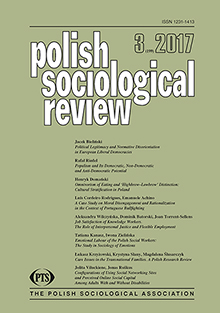Configuration of Using Social Networking Sites and Perceived Online Social Capital Among Adults With and Without Disabilities
Configuration of Using Social Networking Sites and Perceived Online Social Capital Among Adults With and Without Disabilities
Author(s): Jonas Ruškus, Jolita ViluckienėSubject(s): Media studies, Theory of Communication
Published by: Polskie Towarzystwo Socjologiczne
Keywords: social networking sites; online social capital; persons with disabilities; nationally representative survey
Summary/Abstract: Drawing on nationally representative survey 2014 data, this article examines the implications of social networking sites (SNS) use and the relationship with perceived online social capital among Lithuanian adults with and without disabilities. By contributing to the wide academic discussion on the value of online and social networks for people with disabilities, this research shows that intensive participation on SNS (as Facebook) presupposes stronger affective and evaluative dimensions of social capital. This relatively strong affective and evaluative social capital perception is more characteristic of the persons with disabilities (both with physical and sensory disabilities) than the persons without disabilities. The research data also shows that adults with physical disabilities mainly benefit from SNS as a bridging capital resource thanks to its various practical benefits, established connections and contacts, and participation according to one's interests by bypassing the limitations posed by the physical environment. These results add to the positive, optimistic information technology and disability studies discourse which argues that the use of social networking sites is of higher value to the persons with disabilities than the persons without disabilities.
Journal: Polish Sociological Review
- Issue Year: 199/2017
- Issue No: 3
- Page Range: 387-403
- Page Count: 17
- Language: English

